新世纪大学英语教材-第二版-综合教程2-unit1PPT
- 格式:ppt
- 大小:5.89 MB
- 文档页数:78
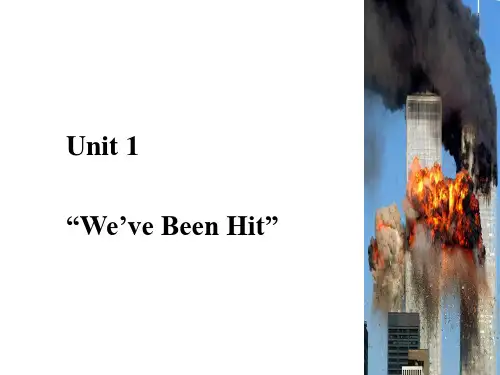
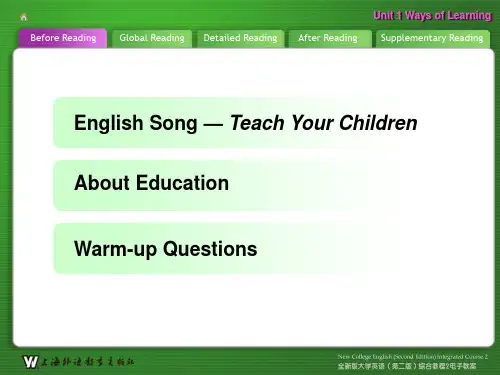
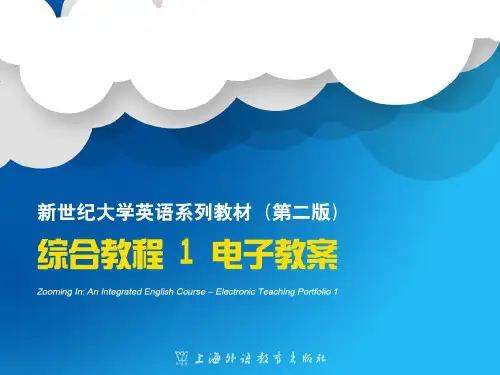
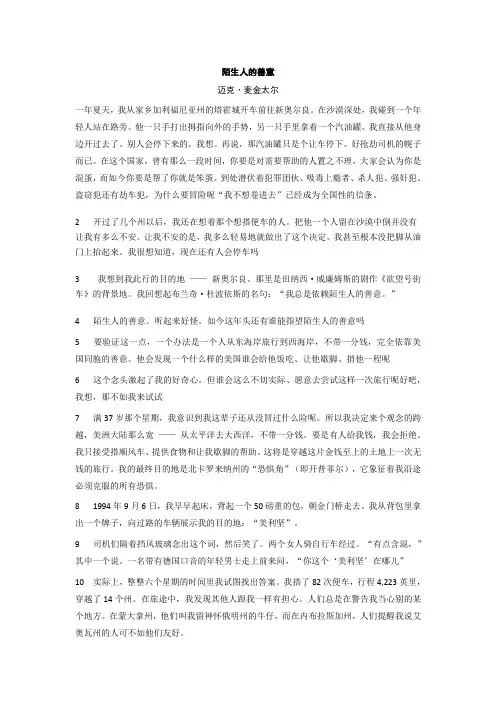
陌生人的善意迈克·麦金太尔一年夏天,我从家乡加利福尼亚州的塔霍城开车前往新奥尔良。
在沙漠深处,我碰到一个年轻人站在路旁。
他一只手打出拇指向外的手势,另一只手里拿着一个汽油罐。
我直接从他身边开过去了。
别人会停下来的,我想。
再说,那汽油罐只是个让车停下、好抢劫司机的幌子而已。
在这个国家,曾有那么一段时间,你要是对需要帮助的人置之不理,大家会认为你是混蛋,而如今你要是帮了你就是笨蛋。
到处潜伏着犯罪团伙、吸毒上瘾者、杀人犯、强奸犯、盗窃犯还有劫车犯,为什么要冒险呢“我不想卷进去”已经成为全国性的信条。
2 开过了几个州以后,我还在想着那个想搭便车的人。
把他一个人留在沙漠中倒并没有让我有多么不安。
让我不安的是,我多么轻易地就做出了这个决定。
我甚至根本没把脚从油门上抬起来。
我很想知道,现在还有人会停车吗3 我想到我此行的目的地——新奥尔良。
那里是田纳西·威廉姆斯的剧作《欲望号街车》的背景地。
我回想起布兰奇·杜波依斯的名句:“我总是依赖陌生人的善意。
”4 陌生人的善意。
听起来好怪。
如今这年头还有谁能指望陌生人的善意吗5 要验证这一点,一个办法是一个人从东海岸旅行到西海岸,不带一分钱,完全依靠美国同胞的善意。
他会发现一个什么样的美国谁会给他饭吃、让他歇脚、捎他一程呢6 这个念头激起了我的好奇心。
但谁会这么不切实际、愿意去尝试这样一次旅行呢好吧,我想,那不如我来试试7 满37岁那个星期,我意识到我这辈子还从没冒过什么险呢。
所以我决定来个观念的跨越,美洲大陆那么宽——从太平洋去大西洋,不带一分钱。
要是有人给我钱,我会拒绝。
我只接受搭顺风车、提供食物和让我歇脚的帮助。
这将是穿越这片金钱至上的土地上一次无钱的旅行。
我的最终目的地是北卡罗来纳州的“恐惧角”(即开普菲尔),它象征着我沿途必须克服的所有恐惧。
8 1994年9月6日,我早早起床,背起一个50磅重的包,朝金门桥走去。
我从背包里拿出一个牌子,向过路的车辆展示我的目的地:“美利坚”。

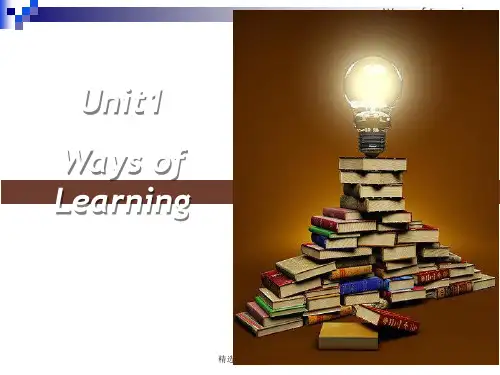
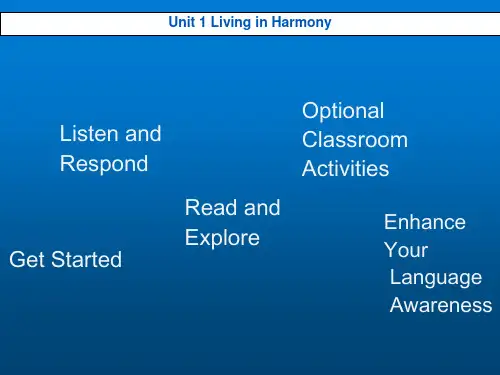

Zooming In: An Integrated English Course(Book II)Unit 1 Living in HarmonyText A: “I Forgive You”I Class Hours: 6II. Teaching Objectivescate students to be more virtuous and inclusive towards the society and people aroundthem.2.Grasp the key words, Phrases and structure.3.Master the skills of writing and reading in this unit.III. Teaching Focus1. Get Started2. Text Organization3. Skill learning in writing and reading4. Language points (key words, phrases and difficult sentences)5. Grammar Focus (Gerunds)6. Guided PracticeIV Class Hours Allotment1st period: Text-related information and warm-up questions.2nd period: Pre-reading activities (New words and Expressions).3rd period: Intensive studies of the text A (Language points).4th period: Intensive studies of the text A (Language points).5th period: Exercises (V ocabulary, word building, structure, translation, cloze and text B).6th period: Listening and speaking activities.V Class Procedures1. Get Started (Warm-up Activities)1). Questions for discussionA) Is it hard to forgive someone? Why or why not?B) Do you have the experience of being forgiven? What is it?C) How do you understand this sentence: We may not know how to forgive, and we may notwant to forgive; but the very fact that we say we are willing to forgive begins the healing practice.2). Background InformationThe Bible: The holy book of the Jewish and Christian religions. The Jewish Bible is made up of 39 parts that tell the story of God’s relationship with the Jewish people in ancient times. These 39 parts also form part of the Christian Bible and are called the Old Testament (旧约全书). The Christian Bible has another 27 parts called the New Testament, which tells the story of Jesus Christ.2. Text OrganizationPart I (para.1-3) Why forgiveness is necessary for human relationships and for your own health and sanity?Part II (para.4- 10)You should act immediately and deliberately to forgive others although it is difficult to do so. At the same time, you should look back on your own warts and be aware of your own flaws.Part III (11-15) Forgiving others can get a satisfying reaction. No matter how the person responds to your effort, you will feel happy once you try to forgive him or her.3. Skill learning in writing and readingThe whole article is arranged in a quite logical order.The author first emphasizes the importance of forgiveness: necessary for human relationships and for your own health and sanity; then, on this fact, he asks people to practice forgiveness immediately and meanwhile look back on their own warts and flaws; at last, he relates people’s happiness to forgiveness without considering the responses from the persons they forgive.4. Language PointsA) New words1) forgiveness: n. [U] when sb. forgives another personEg: She quickly admitted her guilt and asked for our forgiveness.CF: forgive & excuse 这两个动词均有“原谅”之意。
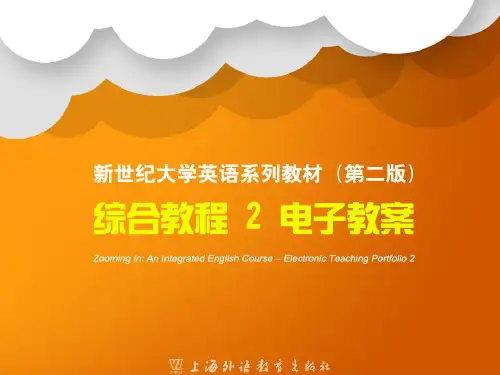
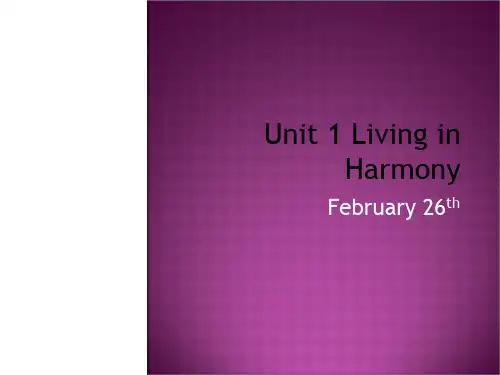
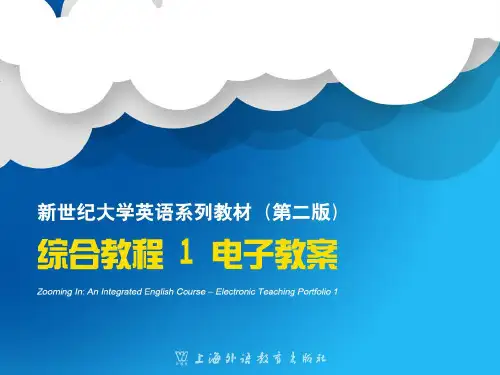
Unit1新世纪大学英语系列教材综合教程2Unit1 Text A New words and Expressions1. notion: n. an idea, belief or conceptOur management system is based on the notions of personal equality and liberty.我们的管理体系是基于人的平等观念和自由观念而建立的。
She has no notion of the difficulty of this problem.CF: idea, concept & notion这些名词均有“思想”,“观点”,“观念”之意。
idea最为普通,几乎适用于任何方面的思维活动。
concept 指从众多实例中通过概括、归纳而形成的对事物本质、全貌及其内部联系的比较系统的概念或看法。
notion指的是一种模糊的、变化莫测的想法,无可靠的基础,是未经深思熟虑的、甚至让人觉得荒谬的观点。
1. She seemed unfamiliar with the concept that everyone should have an equal opportunity.2. I have no idea/notion how she managed to do this.3. I had a silly notion that he would come back and beg me for forgiveness.4. Don’t get any ideas about rev enge.2. criterion: n. a standard by which sth. is judgedThe company’s criterion for success is high sales.To some publishers, the criterion of a book which will sell well is length rather than content.对一些出版商而言,评判一本书能否畅销的标准是长度而非内容。
新世纪大学英语:综合教程第二册(全)新世纪大学英语:综合教程第二册(全)U1Text AComprehension CheckI Directions(Part 1)1) risk2) pulled3) shepherded4) lodging5) ranger6) sacks7) bundles8) noted9) simple10) kinII Directions (Part 2)1) F2) F3) T4) F5) T6) T7) T8) F9) T10) FIII Directions (Part 3)1) D2) C3) B4) A5) BSelf-testI Directions(Part 1)1) B 2) C 3) D 4) C 5) D 6) A 7) C 8) D 9) A 10) A 11)B 12) D 13)C 14) B 15) B 16)C 17)D 18) A 19) D 20) BII Directions (Part 2)1) run contrary to2) pull over3) risk his life4) picked, up5) Come on in6) take a gamble7) help out8) in, circumstances9) have in mind10) pulled away11) stand out12) rely onIII Directions (Part 3)1) F2) A3) D4) C5) B6) EIV Directions (Part4)1) exhausting2) to complete3) to do4) laughing, talking5) informedU2Text A Comprehension CheckI Directions(Part 1)1) rational2) crisis3) good4) self-fulfilling5) great6) upward7) hopeful8) problems9) positive10) ongoingII Directions (Part 2)1) T2) T3) F4) T5) F7) T8) T9) T10) FIII Directions (Part 3)2) D3) D4) B5) ASelf-testI Directions(Part 1)1) A 2) D 3) C 4) D 5) B 6)C 7) A 8)D 9) B 10) C 11) A 12) C 13) D 14) D 15) B 16) C 17) B 18) C19) D 20) CII Directions (Part 2)1) in terms of2) run into3) from a new perspective4) feed on5) slip over6) resulting in7) in reverse8) get the hang of9) by choice10) make a difference11) live through12) had no ideaIII Directions (Part 3)1) E2) D3) A4) F5) C7) BIV Directions (Part4)1) E2) A4) C5) DU3Text A Comprehension CheckI Directions(Part 1)1) prospects2) storage3) used4) doubt5) siren6) fool7) sardines8) 17/seventeen9) withered10) strugglingII Directions (Part 2)1) T2) F3) T5) F6) F7) F8) T9) TIII Directions (Part 3)1) A2) C3) D4) B5) BSelf-testI Directions(Part 1)1) D 2) B 3) A 4) C 5) B 6)C 7) B 8) B 9) A 10)D 11) C 12) B 13) C 14) A 15) B 16) C 17) B 18) D 19) A 20) C II Directions (Part 2)1) in a sense2) pack up3) come up with4) on the side5) came across6) put, to the test7) stay the course8) plunged into9) stick it out10) get the idea11) flooded in12) walk the streetsIII Directions (Part 3)1) undergo2) frame3) unload4) rub6) neglectIV Directions (Part4)1) A3) B4) C5) D6) AU4Text A Comprehension CheckI Directions(Part 1)1) application2) first3) confidence4) start5) lightness6) faith7) love8) cancer9) waste10) courageII Directions (Part 2)1) F3) T4) F5) T6) F7) F8) F9) TIII Directions (Part 3)1) A2) D3) A4) B5) CSelf-testI Directions(Part 1)1) A 2) C 3) D 4) B 5) C 6)D 7) B 8) A 9) A 10) B 11) C 12) B 13) D 14) B 15) C 16) A 17) D 18) C 19) B 20) AII Directions (Part 2)1) drop out2) in the thick of3) Truth be told4) stumbled into5) on the sidelines6) sign off7) fall out8) hand in hand9) take a chance10) fell away11) drown out12) start overIII Directions (Part 3)1) C2) E3) J4) D6) H7) I8) F9) B10) AIV Directions (Part4)1) A2) P3) A4) A5) P6) P7) A8) PU5Text A Comprehension CheckI Directions(Part 1)1) granted2) future3) unimaginable4) listless5) appreciation6) senses7) blessed8) hazily9) pity10) fullnessII Directions (Part 2)2) T3) F4) F5) F6) T7) F8) T9) F10) TIII Directions (Part 3)1) A2) D3) C4) B5) CSelf-testI Directions(Part 1)1) B 2) A 3) D 4) A 5) C 6)A 7) D 8)B 9) B 10)C 11)B 12)C 13) A 14) B 15)D 16) D 17) C 18) A 19) B 20) D II Directions (Part 2)1) long for/longed for2) take in3) in search of4) are in debt to5) had racked his brain6) in particular7) propose a toast8) keep back9) fell into debt10) bestow on11) be singled out12) break the newsIII Directions (Part 3)1) C2) A3) B4) D5) B6) CIV Directions (Part4)1) took2) thought3) would take4) had shifted5) was6) could do7) was8) had to9) was10) would be11) happenedU6Text A Comprehension CheckI Directions(Part 1)1) vital2) two3) score4) specified5) role6) oneness7) direction8) loyalty9) rash10) meritsII Directions (Part 2)1) T2) F3) F4) F5) T6) T7) F8) T9) F10) TIII Directions (Part 3)1) D2) A3) C4) D5) BSelf-testI Directions(Part 1)1) B 2) A 3) D 4) C 5) A 6)D 7) B 8) C 9) A 10) D 11) B 12) C 13) A 14) B 15) D 16) A 17) B 18) C 19) B 20) CII Directions (Part 2)1) feel free2) to his credit3) get in the way4) in line with5) Assess, on its merits6) took in/has taken in7) take up8) shift the blame onto9) followed the herd10) lose heart11) In view of12) pave the way forIII Directions (Part 3)1) B2) E3) C4) F5) A6) DIV Directions (Part4)1) A2) A3) B4) C5) B6) A。